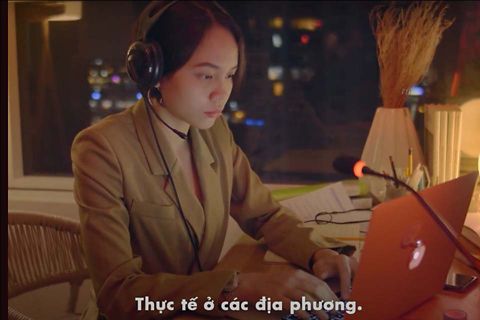- Study load
- Full time
- Program code
BP317
- Duration
- 3 years
- Application deadlines
-
14 Feb 2025
10 Oct 2025
- Intakes
- Feb or Mar, Oct
- Location
- RMIT Saigon South
- Program code
- N/A
- Application deadlines
- N/A
BP317
14 Feb 2025
10 Oct 2025
The Bachelor of Languages program aims to equip its students with a diverse set of skills, including advanced language proficiency, critical thinking, effective communication, and cross-cultural awareness. This program, with its characteristic flexibility, acts as a key opening the door to many possibilities across numerous industries.
The Translating and Interpreting major utilises cutting-edge translation and interpreting technologies and tools, including simultaneous interpreting booths and specialised software to help you master the art of translating written and spoken texts from one language into another and interpreting conversations and speeches in real-time.
Your studies will include an overview of popular theory, issues and opportunities in language and related industries, and engagement in real-world projects from industry partners.
A significant advantage of the program is that you can couple your linguistic and cultural competence with a wide range of minors, including Japanese language, Communication, Global Business, Digital Marketing, Tourism and Hospitality or Management and Change. This strong emphasis on cultural competence and intercultural communication will help students break barriers and build bridges between people, communities, and cultures.
On completion of your program, you will be eligible to take an internationally recognised translating and interpreting proficiency test. Studying at RMIT will give you an edge in the job market, as employers seek graduates with cultural understanding in addition to language skills, as well as an international qualification.

The structure displayed shows the advised program structure and progression.
You may choose from the following minors:
* University elective: Students can choose from elective courses offered across the university in any program.
Program guide for RMIT Saigon South.
RMIT offers a multicultural learning environment (including teaching by Japanese nationals in the Japanese minor) and other highly qualified academics who have a background in the industry.
The Bachelor of Languages places a strong emphasis on face-to-face learning in years one and two, followed by two WIL (Work-Integrated-Learning) courses, and further cultural studies in your final year. The WIL courses include a project and an internship where you can put what you’ve learned into real-world practice.
As part of the Language and Culture capstone project you will develop a bilingual product, system, or event. You will expand and enhance your cross cultural communicative skills and knowledge through engaging problem based tasks that focus on language issues in a globalised context. For example, you may work online to develop a digital marketing communication strategy for a Japanese corporation.
Assessment tasks in this program will include some of the following:
In this program you will be assessed on your development of program learning outcomes in areas of communication, life-long learning, global outlook, cultural and social awareness and work preparedness.
RMIT provides world-class blended learning with both face-to-face and online experiences in a global network, a supportive community, and real-world skills.
Graduates in Languages can pursue careers in various industries that correspond to their major and minor. Positions are varied and span sectors ranging from business, international service industries, and media and entertainment to embassies, and international representative offices. Some job titles include:
When you successfully complete this program, you may be eligible for entry into an RMIT honours or postgraduate program in Vietnam and Australia.
Payments can be made each semester, on a course-by-course basis.
Fee program |
Annual tuition fee(based on full time study load - 8 courses) |
Whole program fee(24 courses - 288 credits)
|
| 14,187 USD (indicative USD fee) ~ 351,264,000 VND | 42,560 USD (indicative USD fee) ~ 1,053,792,000 VND |
Notes:
Successfully complete RMIT Vietnam English Advanced, or complete one of the following English proficiency tests:
For other recognised English results, please view English equivalency requirements.
Previous study and proficiency tests are recognised for two years from the completion date or test date to the program commencement date unless stated otherwise. RMIT does not accept scores from at-home or online testing.
Where you have achieved more than one form of English language proficiency only the most relevant achievement will be considered in the admission decision.
Please contact the RMIT Vietnam Student Recruitment team for more information.
The Translating and Interpreting stream requires students to translate between languages; accordingly, you need to demonstrate advanced language skills in two languages, one of which will be English.
You may be required to demonstrate your proficiency in your selected language other than English (LOTE) through attainment of the following results.
If you choose the Japanese minor, you are required to complete the LOTE and Japanese placement form but there is no required Japanese language proficiency level at entry.
Upon completing the LOTE and Japanese placement form at the time of application, RMIT will decide whether a LOTE or Japanese placement test is required.
Don't meet the English language test scores? Successfully complete English for University for entry into this program.
Come from a partner institution? RMIT has pathway arrangements with many partner institutions around the world. If your institution has a pathway arrangement with RMIT, you may be able to receive credit and reduce the time it will take to complete your preferred RMIT program.
Find out if your institution has a pathway arrangement with RMIT.
If you have qualifications from an institution that is not an RMIT partner, credit into your RMIT program will be assessed on a case-by-case basis.
Please contact the RMIT Vietnam Student Recruitment team for more information.